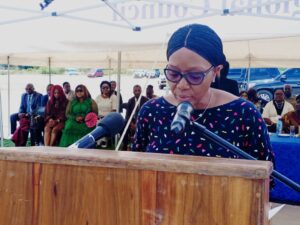
By:Annakleta Haikera
Human Rights Day was commemorated in Rundu in the Kavango East region last Saturday, which coincided with the end of the 16 Days of Activism Against Gender-Based Violence.
In Namibia, Namibian Women’s Day was enacted by parliament with the same celebration day as the International Human Rights Day with the efforts to raise the importance of protection of human rights, especially the rights of the most vulnerable groups such as women and children.
Namibia Women’s Day is also an important national day that urges Namibian citizens to remember the struggles and sacrifices paid for the attainment of democracy and the protection of human rights in the country. Built upon the unforgettable tragic events on December 10, 1959, which saw at least 11 people killed killing 11 and 44 wounded when colonial police opened fire on an unarmed crowd.in Windhoek’s Old Location.
Speaking at this year’s commemoration of the International Human Rights Day and Namibia Women’s Day at Rundu, prime minister Saara Kuugongelwa-Amadhilasaid the events of 10 December 1959strengthened the resolve of Namibians to end colonialism and also gave momentum to the national liberation efforts.
“They (the events) also put a spotlight on human rights abuses by the colonial authorities in Namibia and the resolve of Namibian women to actively participate in the fight against colonial oppression as demonstrated by the heroic acts of Kakurukaze Mungunda. The heroic act of meme Mungunda on that day is representative of the bravery and sacrifices made for our freedom and the development of our country by many courageous Namibia women,” Kuugongelwa-Amadhila said.
The prime ministerreiterated the government’s commitment to respect and protect the rights of all people and their dignity, saying however that unemployment is the main cause of poverty which undermines human dignity.
She said it is important for people to have a full understanding of what is meant by human rights, adding that it is a violation of human rights when you beat up a woman, deny a women food or sharing in the family’s resources and treating her in an undignified manner by insulting her.
Kuugongelwa-Amadhila said government has adopted a series of laws and policies to do away with discrimination. She said this includes the affirmation action act which promotes equal opportunities at work.
The premier said the implementation of affirmative action in the public service has led to an increase in the employment of previously disadvantaged persons, including women who account for 98.3% of the government workforce. She said the quota of women in management positions in government stands at 42% in 2021, while 58.1% are in non-management positions.
“The government will remain committed to ensure that we build on success by,among others,improve employment of persons with disabilities,” she said.
“I commend all stakeholders to continue partnership with the Government in the fight against GBV.”
Global Gender Gap Report of 2021 shows that Namibia is ranked sixth, which makes her the highest-ranked African country for bridging the gap between women and men’s economic opportunities, educational attainment, health and political empowerment measure.
“The government is implementing programmes to ensure a sound policy environment, to provide access to finance and markets, as well as skills and mentorship to support private businesses, including youth and women enterprises.”
Berthiliah Simbaranda-Vistor, owner of Care Unit Institute, the first ever private mental health clinic in Rundu said cases of GBV inKavango East region are increasing.
“The good part is that people are now aware of where to report the abuse cases. They also have numbers to call and report such cases. In the past, they were not well acquainted with the laws and their rights, but after much awareness, women and children are now coming up to report and arenot dying in silence anymore.”
Simbaranda-Vistor further said women are beginning to assert their human rights. “GBV has contributed to the mental health of women and children and it needs to end,” she pointed out.
US Chargé d’Affaires to Namibia, Jessica Long said on the same day in 1948, the United Nations General Assembly adopted the Universal Declaration of Human Rights, a document that strengthens and affirms core values that the US and Namibia share.
“Human rights – and working for and protecting them – is a foundation of the very system of democracy that citizens in our two countries hold dear,” Long said.
“One of the most important reminders of Human Rights Day is that we must never take human rights for granted. Every day, from gentle tending to dangerous struggle, we who believe in human rights need to take actions to protect them. But we must also remember on this day that we must advocate for the rights of others, just as we labour for our own because lack of rights and a failure to be treated with dignity can be one of life’s greatest inequalities.”









Comments